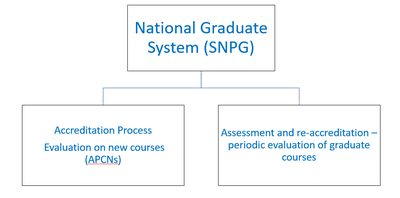Evaluation
Evaluation: concepts, processes and principles
Evaluation
The Evaluation of the National Graduate System (SNPG – acronym in Portuguese), as established in 1998, is conducted by the Department of Evaluation/CAPES and carried out with the participation of the academic and scientific community and the ad hoc consultants. The evaluation process is an essential activity to assure and maintain the quality of master and doctorate programs in the country.
Evaluation Objectives
- Assurance of quality of the Brazilian graduation system (which guides the distribution of scholarships and resources to promote scientific research)
- Identification of strategic fields of knowledge in the SNPG and also regional asymmetries in order to guide inductive actions in the establishment and expansion of graduation programs nationwide.
- Support graduate studies for professionals in all teaching levels;
- Qualification of human resources for non-academic purposes;
- Strengthening the basis of science, technology and innovation in Brazil;
Objectives of the National Post-Graduation System (SNPG)
SNPG can be divided in two main processes – accreditation and assessment and re-accreditation of professional masters (MP), academic masters (ME) and doctorates (DO).

Both processes are based on the same principles:
- Recognition and reliability based on quality ensured by peer review;
- Criteria updated and discussed by the academic community in each evaluation period;
- Transparency: wide dissemination of actions, decisions, and results:
- at Capes website;
- on the areas of evaluation pages.
The evaluation is conducted by 50 areas of evaluation (data from 2017) – and follows the same set of basic requirements established by the Scientific and Technical Council for Higher Education (CTC-ES).
References for the Evaluation Process:
The documents of areas are the references for the evaluation processes not only for the elaboration and the submission of proposals of new courses but also for the quadrennial evaluation of on-going courses. In the documents of areas is described the current situation, characteristics and perspectives, as well as the priority elements for the assessment of all 50 areas of evaluation.
The documents of each area, the Evaluation Forms and the Evaluation Reports are the triad of the processes and results of the Quadrennial Evaluation.
The documents of area and the evaluation reports are available in each area of evaluation page.

